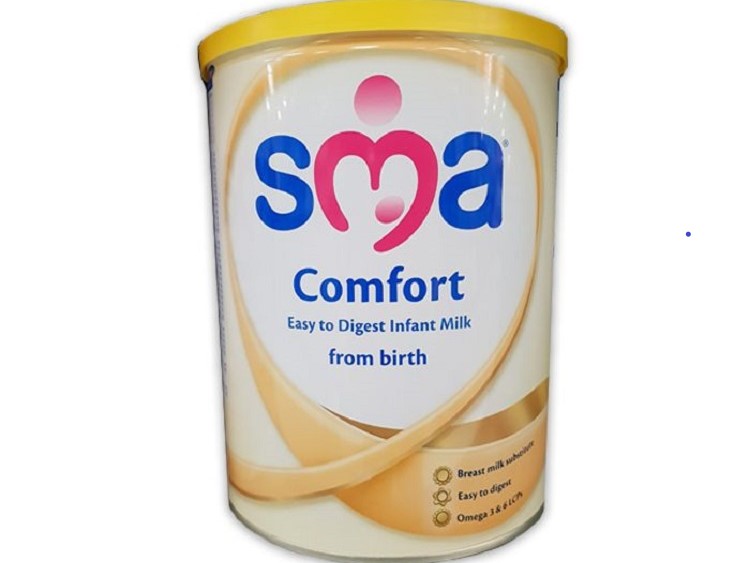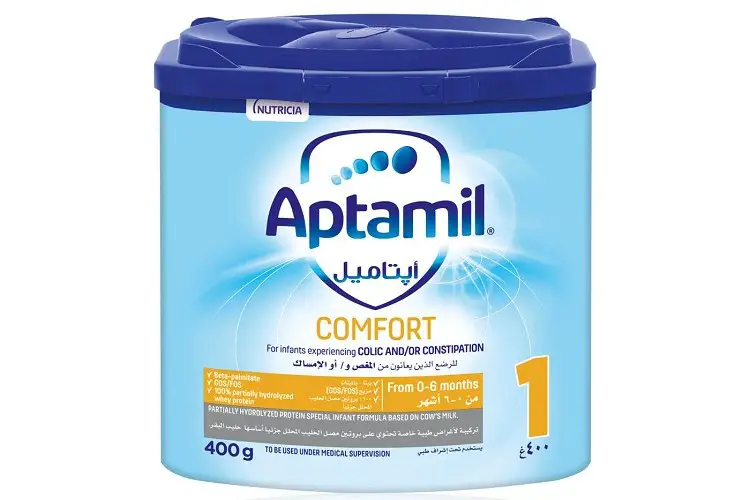If there is anything that formula milk does for your baby, it is the provision of nutrients for your babies, enabling them to grow and develop.
Remember that formula will always be the formula, breast milk will be breast milk, and their health benefits are incomparable.
Sometimes you need clarification as to which formula brand will be ideal for your baby, and start asking questions like SMA comfort vs Aptamil comfort.
SMA Comfort and Aptamil Comfort are quite similar in their nutritional content. The formulas are specially designed to manage colic and constipation through feeding.
They contain 100% whey, partially hydrolyzed protein that is easier to digest than intact protein.
The main difference between SMA comfort vs Aptamil comfort is the price and the magnesium content. Aptamil is pricer and has less magnesium, while SMA Comfort has high magnesium and is less pricer.
Types of Formula
When we talk about formula milk, we are talking about baby formula or infant formula. It is gotten from cows’ milk that must have been treated to ensure that your baby’s health is not jeopardized after consuming it.
It comes in many different brands and types and is available in pharmacies and shops.
Ensure that the labels are carefully scrutinized so you don’t get the wrong formula for your baby.
There are mostly two formula forms: a dry powder that you prepare with water or a ready-to-feed liquid formula.
The ready-to-feed liquid formula is very convenient and easy to use, but then it is more expensive and, once opened, needs to be used more quickly.
Are any baby formula milk brands better than others?
There are basic ingredients every formula must contain, and then in addition to the core ingredients, all formulas contain extra ingredients, and most times, across the brand, they are the same.
These include LCPs (long-chain polyunsaturated fatty acids), nucleotides, and prebiotics.
Many formulas include an additional prebiotic ingredient: oligosaccharides. These are often referred to as FOS or GOS, produced commercially from lactose and sucrose, or 2’-FL or LNnT, artificially made to mimic oligosaccharides found in breast milk.
Besides the addition of DHA, an LCP that the EFSA has accepted contributes to the normal visual development of infants up to 12 months; the other extra ingredients are not of proven benefit.
Researchers often believe these additional ingredients don’t make one formula superior. If they were, the compositional criteria for the formula milk would be amended.
What is a Comfort Formula?
Any formula termed comfort contains cows’ milk proteins that have already been partly broken down (partially hydrolyzed).
The intention is to make it easier to digest and help prevent digestive problems such as colic and constipation. However, there’s no evidence for this.
The comfort formulas are not best for babies with cow’s milk allergy, so it is advisable to include them in your baby’s diet should your baby have cow’s milk allergy.
It is also interesting to know that all the leading formula brands have a range of milk marketed as ‘comfort’ or ‘easy to digest’ so that they are not found wanting in satisfying the need of their customers with the need for comfort formula.
They contain 100% whey protein, which has been partially hydrolyzed (broken down) and contains less lactose than standard formulas.
The Aptamil, SMA, and Cow and Gate versions also contain a thickener. The reason for this is to have a more controlled intake and to help your baby take in less air when feeding, according to the brands.
Sma Comfort Vs Aptamil Comfort (Features, Pros & Cons)
SMA Comfort

SMA® Comfort is a nutritionally complete, easy-to-digest formula and can be used for babies from birth to 12 months.
Its manufacture was ideally for the dietary management of colic and constipation but should be used under medical supervision.
SMA® Comfort contains ingredients that are ideal for managing colic and constipation.
Key features
- Forever recyclable steel tin
- Easy scoop
- easy to recycle
- The protective lid is also recyclable
Pros
- Associated with increased Magnesium levels
- Reduced crying time in infants with colic
- Associated with lower lactose levels
- Has an increase in beneficial bacteria in the infant gut microbiome
- Easy to digest
- It contains 100% whey, a partially hydrolyzed protein that is easier to digest than intact protein.
- The increased magnesium levels help with stool consistency improvement.
Cons
- It is very thick and may require a fast-flow teat.
- It doesn’t go well with other food thickeners or antacids.
Nutritional Information
| Energy | 270 kj 65 kcal |
| Fat | 3.3g |
| Carbohydrate | 7.3g |
| Fibre | 0.3g |
| Protein | 1.2g |
| Salt (=Sodium x 2.5) | 0.06g |
| Vitamins | |
| Vitamin A | 63 µg |
| Vitamin D | 1.6 µg |
| Vitamin E | 1.3 mg |
| Vitamin K | 4.4 µg |
| Vitamin C | 9.7 mg |
| Thiamin | 0.06 mg |
| Riboflavin | 0.06mg |
| Niacin | 0.44 mg |
| Vitamin B6 | 0.03mg |
| Folate | 21.5 µg |
| Vitamin B12 | 0.16 µg |
| Biotin | 1.4 µg |
| Pantothenic Acid | 0.32mg |
| Minerals | |
| Sodium | 25mg |
| Potassium | 70mg |
| Chloride | 53 mg |
| Calcium | 44mg |
| Phosphorus | 26mg |
| Magnesium | 8.1 mg |
| Iron | 0.67mg |
| Zinc | 0.63mg |
| Copper | 0.05 mg |
| Manganese | 0.02mg |
| Fluoride | ≤0.07 mg |
| Selenium | 3.7 µg |
| Chromium | ≤6.5 µg |
| Molybdenum | ≤9.1 µg |
| Iodine | 14 µg |
Others
| Oligosaccharides (GOS/FOS) | 0.4g |
| Taurine | 4.1mg |
| Choline | 23mg |
| Inositol | 4.6mg |
| L-Carnitine | 1.9mg |
| Nucleotides | 1.9mg |
| Omega 3 α-linolenic Acid (ALA) Docosahexaenoic Acid (DHA) | 43mg 16.5mg |
| Omega 6 Linoleic Acid (LA) Arachidonic Acid (AA) | 494 mg 16.5 mg |
Aptamil Comfort

Aptamil Comfort is also specially designed to manage colic and constipation through feeding.
It has less lactose than the standard Aptamil First Infant milk and should be used most times on recommendation from your healthcare professional.
Colic usually involves repeated, excessive, and inconsolable crying. Suppose you notice that your baby is experiencing constipation. In that case, they will have fewer bowel movements or difficulty passing unusually small or large, hard stools.
Pros
- It contains a unique blend of Galacto- and Fructo-oligosaccharides (GOS/FOS), which helps increase stools’ frequency and softness.
- It also contains less lactose than standard milk to reduce gas and other intestinal discomforts.
Cons
- It is costly
- It may cause very loose stool and diarrhea for your baby
- It makes your baby pass out very dirty poo
Nutritional Information
| Energy | 276kJ/66kcal |
| Fat | 3.4g |
| Carbohydrate | 7.0g |
| Fibre | 0.6g |
| Protein | 1.5g |
| Salt | 0.09g |
| Vitamins | |
| Vitamin A | 58µg |
| Vitamin D | 31.7µg |
| Vitamin E | 1.7mg TE |
| Vitamin K | 14.9µg |
| Vitamin C | 9.1mg |
| Thiamin (B1) | 0.06mg |
| Pantothenic acid | 0.57mg |
| Riboflavin (B2) | 0.14mg |
| Niacin (B3) | 0.43mg |
| Vitamin B6 | 0.04mg |
| Folate | 14.0µg |
| Vitamin B12 | 0.08µg |
| Biotin | 1.7µg |
| Minerals | |
| Sodium | 28.0mg |
| Potassium | 81mg |
| Chloride | 51 mg |
| Calcium | 59 mg |
| Phosphorus | 33 mg |
| Magnesium | 5.1 mg |
| Iron | 0.73mg |
| Zinc | 0.48mg |
| Copper | 0.051 mg |
| Manganese | 0.006mg |
| Fluoride | ≤0.006 mg |
| Selenium | 3.0 µg |
| Chromium | ≤6.0 µg |
| Molybdenum | ≤6.0 µg |
| Iodine | 13 µg |
Others
| L-Carnitine | 2.1mg |
| Choline | 25mg |
| Taurine | 5.4mg |
| Non-caloric carbohydrate (GOS°) | 0.2g |
| Nucleotides | 2.3mg |
Related Posts
SMA Comfort vs Aptamil Comfort (Similarities & Differences)
Similarities
- Both formulas contain 100% whey, partially hydrolyzed protein which is easier to digest than intact protein.
- Both formulas are easy to digest
- Both formulas enhance reduced crying time in infants with colic
- Both formulas are best in colic management
- Both formulas are very thick and may require a fast-flow teat.
Differences
- Aptamil comfort is more expensive than SMA comfort.
- SMA Comfort has more magnesium in it than Aptamil Comfort.
Conclusion
I am sure your question on SMA comfort vs Aptamil comfort has been answered, and you have in-depth knowledge of both products.
The choice is yours, as any of them will be good for your baby experiencing colic. Remember to discuss with your health care professional before taking any decision.
Any formula termed comfort contains cows’ milk proteins that have already been partly broken down (partially hydrolyzed).
The intention is to make it easier to digest and help prevent digestive problems such as colic and constipation.
The comfort formulas are not best for babies with cow’s milk allergy, so it is advisable to include them in your baby’s diet should your baby have cow’s milk allergy.
